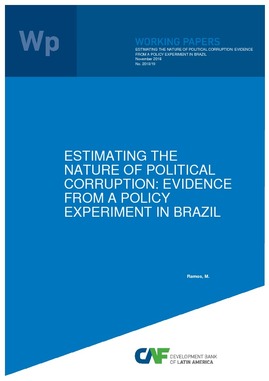Mostrar el registro sencillo del ítem
Estimating the nature of political corruption: evidence from a policy experiment in Brazil
| dc.contributor.author | Ramos, M. | |
| dc.coverage.spatial | América Latina y el Caribe | es_ES |
| dc.date.accessioned | 2019-02-25T20:04:27Z | |
| dc.date.available | 2019-02-25T20:04:27Z | |
| dc.date.issued | 2018-11-25 | |
| dc.identifier.citation | Ramos, M. (2018, November 25). Estimating the nature of political corruption: evidence from a policy experiment in Brazil. Caracas: CAF. Retrieved from https://scioteca.caf.com/handle/123456789/1391 | en |
| dc.identifier.uri | https://scioteca.caf.com/handle/123456789/1391 | |
| dc.description.tableofcontents | This paper proposes a test to estimate the nature of political corruption in developing countries: embezzlement by self enriching politicians versus corruption that originates as a quid-pro-quo from campaign contributions. If politicians decide whether to be corrupt rationally, then increasing the punishment for corrupt practices or the probability of getting caught should reduce corrupt practices (Becker, 1968). If corruption is a response of politicians to firms that finance their campaigns, an increase in punishment should yield not only a reduction in corruption but also a reduction in the demand for projects that are corruptible, such as projects on infrastructure. We test these explanations for corrupt practices using a randomized policy experiment in Brazil. We exploit the fact that some municipalities were randomly chosen to have their probability of being audited increased and we analyze public data of block grants. We find a significant decrease in the resources requested by the mayors to execute projects in infrastructure. This effect is stronger if the municipality has been audited in the past, evidence that mayors respond to credible policies. Moreover, this effect is larger if the mayor’s campaign was strongly financed by construction companies. Finally, treated mayors have their performance in subsequent elections worsened and get less financed by construction companies after the experiment happened. In sum, our findings suggest that mayors are committed to campaign contributors and respond to larger probability of audits by reducing the amount of resources requested for infrastructure projects. | es_ES |
| dc.language.iso | en | es_ES |
| dc.publisher | CAF | es_ES |
| dc.subject | Democracia | es_ES |
| dc.subject | Economía | es_ES |
| dc.subject | Investigación socioeconómica | es_ES |
| dc.subject | Corrupción | |
| dc.title | Estimating the nature of political corruption: evidence from a policy experiment in Brazil | es_ES |
| dc.type | workingPaper | es_ES |
| dc.publisher.city | Caracas | es_ES |
Ficheros en el ítem
Este ítem aparece en la(s) siguiente(s) colección(ones)
-
6.1 Documentos de trabajo en investigación socioeconómica
En esta colección se encuentran los documentos de trabajo sobre temas económicos y sociales prioritarios para la región.


